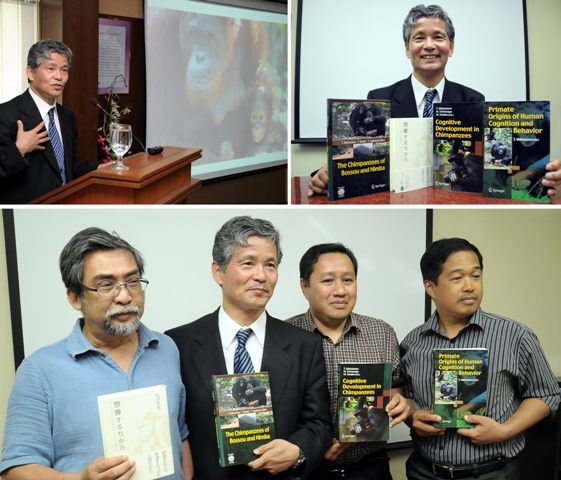MALAYSIA NEEDS TO PRODUCE ORANGUTAN EXPERTS

PENANG, 5 March 2013 - Malaysia was strongly recommended to take the golden opportunity in creating an authority by producing experts on the biodiversity of orangutan, considering Malaysia is fortunate being an original habitat for this primate other than Indonesia.
Professor Dr. Tetsuro Matsuzawa of the world renowned primate research centre (mammals), Primate Research Institute (PRI) Kyoto University, Japan, said that not all countries have the privilege of Borneo and Sumatra.
Thus, he said, Universiti Sains Malaysia (USM), in particular, which also has the School of Biological Sciences, has tremendous potential to develop a thorough study of the orangutan and publishing high-impact journals that can be shared all over the world.
“It is surprising that there is no orangutan expert in the whole country while there are more than 10,000 orangutans in three animal conservation centres in the country (Borneo).
“Based on my observation as a scientist, I also found that not many people cared about these things even though the species is now facing extinction due to three main factors, namely, deforestation, poaching and disease,'' he said.
He said this in a press conference after delivering a lecture related to biodiversity and the ability of chimpanzees which also belongs to the family of primates here today.
He added that it also reflects the beauty of existence of the ecosystem and a symbol of the tropical rain forest biodiversity that exists in this country.
Matsuzawa also said that despite the size of Borneo island, there are now only three major areas preserved as wildlife reserves and they included Imbak Canyon, Danum Valley and the Maliau Basin.
“No doubt the work of research and preservation of biodiversity is costly but it is something worthwhile to enhance knowledge and for the development of science.
“We need to find a way and an intensive discussion should be held to evaluate animal research that can be developed in this country more comprehensively,'' he said.
He said the matter will be discussed further with the university under the framework of the cooperation plan with PRI through the Memorandum of Understanding signed in 2011.
He added that the number of orangutans in this country is declining and it is estimated we lose about 30 percent of the total number of animals every 10 years.
Matsuzawa wished to share his experience and expertise of more than 35 years conducting research in biodiversity of chimpanzees, including those in reserves and the wild, with USM.
In the context of the habitat of chimpanzees, Matsuzawa has spent time in a number of locations in South Africa with studies covering places like Bossou, Nimba, and Guinea.
According to him, chimpanzees at the early age of five have a very strong cognitive capacity and memory as demonstrated in their ability to excel in memory tests and complete a sequence of numbers from 1 to 19 with single view displays of scattered figures on a computer screen.
He said, through his studies, he was also able to identify the distinctions between human and the chimpanzee in which human is seen more likely to have hope, imagination and have pressing needs than the animal.
“Chimpanzees are more relaxed and just focused on life at the current moment. Thus, these animals do not have the imagination and hope, but are very attracted to certain activities such as painting,” he said.
Also present at the ceremony were the School of Biological Sciences Dean, Assoc Prof Ahmad Sofiman Othman with other researchers from the school, including Prof. Mashhor Mansor and Assoc Prof Dr. Shahrul Anuar Mohd Sah. - Text: Marziana Mohamed Alias/Photo: Mohd Fairus Md. Isa/Translation: Yong Check Yoon
- Created on .
- Hits: 1510
